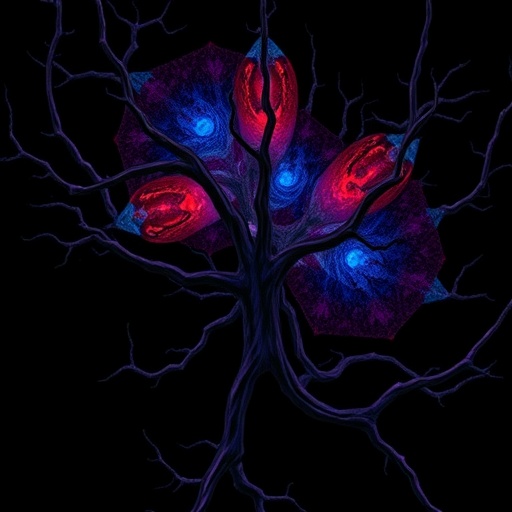Recent research has unveiled a striking interplay between glycogen levels in astrocytes and behavioral variations between sexes, particularly focusing on anxiety-related responses and maternal care shortcomings. The study conducted by Shi, Zhu, and Zhang highlights the often-overlooked role of astrocytic glycogen depletion, revealing significant changes in both astrocytic and synaptic structures. These alterations emerge as vital factors contributing to sex-specific behavioral manifestations, thus opening a new avenue for understanding the neurobiological underpinnings of anxiety and maternal behaviors.
Astrocytes, a type of glial cell within the brain, have historically been underestimated in their role in neurobiology, often overshadowed by neurons. However, recent findings underscore their critical contributions, particularly concerning energy metabolism. Glycogen, a key energy reservoir in the brain, serves as a vital substrate for both neuronal and astrocytic function. The depletion of this glycogen stockpile appears to have dramatic implications for the structural and functional integrity of astrocytic networks, as well as potential downstream effects on synaptic communication.
What makes this study particularly intriguing is its focus on sex dimorphism, a term that refers to the differences in characteristics between males and females of the same species. Interestingly, the researchers found that glycogen depletion triggered divergent effects on astrocyte morphology and synaptic structure in male and female subjects. These disparities suggest that astrocytic responses are not only influenced by metabolic states but also shaped significantly by sex-specific biological factors.
The behavioral ramifications of glycogen depletion were unmistakable. The study observed anxiety-like behaviors in subjects exhibiting glycogen scarcity within their astrocytes. This link between energy metabolism and anxiety suggests that maintaining adequate glycogen levels could be crucial for emotional regulation. In scenarios marked by stress or anxiety, the availability of this bioenergetic resource might protect against the psychological impacts of such states, providing an insight into potential therapeutic avenues for anxiety disorders.
Moreover, the implications for maternal care are profound. The results indicated that astrocytic glycogen depletion corresponded with deficits in maternal behaviors, particularly relating to nurturing and protective instincts. Given the critical role that maternal care plays in the developmental trajectory of offspring, understanding these underlying mechanisms could pave the way for tailored interventions aimed at improving maternal mental health and child development.
This study also emphasizes the need for a comprehensive understanding of the complex biochemical signaling pathways involving astrocytes. These cells communicate not only with neurons but also with each other, forming a vast network that supports overall brain function. The manipulation of glycogen levels may therefore affect neuroinflammatory processes, synaptic plasticity, and even neurogenesis — fundamental aspects of brain health and behavior.
In exploring the biochemical pathways involved, it’s essential to consider the role of neurotrophic factors, neurotransmitters, and metabolic substrates. Astrocytes play a pivotal role in modulating the synaptic environment, affecting neurotransmitter levels, and thus shaping behavioral outcomes. Disruptions in this delicate balance through glycogen depletion could lead to compounded vulnerabilities, particularly in the face of stress, suggesting a protective role that glycogen may serve in neuronal health.
The sex differences observed in the remodeling of astrocytic and synaptic structures align with existing hypotheses regarding hormonal influences. Estrogens, for instance, have been shown to modulate astrocytic function and neural connectivity, potentially exacerbating the effects of glycogen depletion in females compared to males. Understanding these hormonal interactions could further our grasp of sex-specific vulnerabilities to neuropsychiatric disorders.
As the field advances, these findings may catalyze a shift in how we approach treatment for anxiety and maternal health issues. Traditional therapies often address symptoms rather than underlying metabolic or structural deficits. By targeting astrocytic function and restoring glycogen levels, we could potentially develop innovative strategies that address the root causes of behavioral disorders rather than merely their manifestations.
Furthermore, the implications extend beyond human health. Understanding how glycogen metabolism in astrocytes affects behaviors may also provide insights into animal behavior, evolutionary adaptations, and even social structures. The concept of energy allocation and its influence on social behaviors could have broad ecological implications, allowing scientists to draw parallels across species.
In summary, the groundbreaking research led by Shi and colleagues reveals the critical interplay between astrocyte glycogen levels and behavioral outcomes in a sex-dimorphic context. This exploration not only illuminates the role of astrocytes in brain metabolism but also enhances our understanding of complex behaviors linked to emotional regulation and parenting. While more research is necessary to unravel the intricate details of these processes, the potential for new therapeutic targets shines through, promising a future where metabolic health is duly recognized as fundamental to psychological well-being.
This pioneering investigation truly enriches the discourse on neurobiology, emphasizing that the cerebral landscape is as much about energy metabolism as it is about neurotransmission. The study serves as a clarion call, urging both scientists and clinicians to revisit their perceptions of glial cells and the essential roles they play, particularly in addressing neurological and psychological challenges that persist in contemporary society.
The path forward will undoubtedly require interdisciplinary collaboration, bridging the gap between neuroscience, psychology, and metabolic research. Such integrative efforts could lead to transformative advancements in our understanding of cognitive and emotional health, ultimately fostering improved therapeutic outcomes.
Subject of Research: Glycogen depletion in astrocytes and its impact on sex-dimorphic behaviors including anxiety and maternal care deficits.
Article Title: Glycogen depletion in astrocytes induces sex-dimorphic remodeling of astrocytic and synaptic structures with concomitant anxiety-like behaviors and maternal care deficits.
Article References:
Shi, X., Zhu, Y., Zhang, Z. et al. Glycogen depletion in astrocytes induces sex-dimorphic remodeling of astrocytic and synaptic structures with concomitant anxiety-like behaviors and maternal care deficits.
Biol Sex Differ 16, 41 (2025). https://doi.org/10.1186/s13293-025-00723-6
Image Credits: AI Generated
DOI: 10.1186/s13293-025-00723-6
Keywords: Astrocytes, Glycogen Depletion, Sex Dimorphism, Anxiety, Maternal Care, Neural Metabolism, Behavioral Neuroscience.




